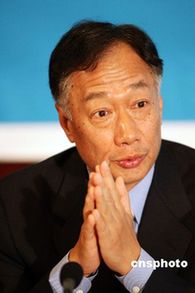Cities vie for Terry Gou's money
|
|
|
Terry Gou, Taiwan's richest entrepreneur, actively seeks investment opportunites in China's mainland.[cnsphoto] |
Terry Gou, Taiwan's richest entrepreneur and chairman of the world's largest contract manufacturer of electronics, is undoubtedly the most sought after person in China's business domain.
With global economic prospects gloomy and uncertain, Gou has actively sought investment opportunities in China's mainland. His bold investments have made local governments rejoice at the thought of economic growth during such a rough time.
"There was a great deal of negotiation involved over the last five years before we got his investment. It was not easy for Chengdu to stand out in those cities vying for investment," recalled Zheng Li, vice director of Chengdu Hi-tech Zone.
Although Chengdu was one of the cities that eventually received his investment, it was a long road to get there. Behind the scenes was a war between local governments, all competing for the money and representing different interests.
Gou's investments can impact a city's economy to such an extent that the mainland has given him the nickname, "Mayor of Foxconn City."
As the founder of Foxconn and its parent company Hon Hai Group, Gou has always been a risk-taker. In the past two decades, Foxconn, which manufactures iPods for Apple, has achieved astounding growth through aggressive investment in the mainland's electronic industries, including PCs, telecommunications, consumer electronics and auto electronics.
Hon Hai Group and Foxconn were both hit hard by the global financial crisis. Compared with 2007 figures, Foxconn technology posted an 83 percent loss in profit last year, destroying the myth that Gou had never lost money since he started doing business in 1974. At the end of 2008, Foxconn cut jobs massively and relocated its industrial complex in hopes of weathering the storm.
Things began to turn around as the crisis bottomed out. In the first half of this year, Foxconn stepped out of difficulties. By exploring the mainland market and cutting industrial costs, Gou was able to expand his investments from coastal cities to inland cities.
Chongqing was the first city in China's western region to receive Foxconn investments, although it was definitely not the first city to be considered. Chengdu and Fujian's Xiamen had also been big contenders from the outset.
Zheng said Chengdu had been interested in Foxconn's project since 2004. After Intel located its chip packaging project in Chengdu in 2003, the city better known as a tourism destination started focusing on investment projects.
"As a city, we still lack downstream companies to make a complete industrial chain," Zheng said. "Foxconn's project is just what we need."
Over the past few years, the Chengdu government dispatched high-ranking officials to promote the city. Last April, the city's Party Secretary Li Chuncheng invited Gou to tour Chengdu. The tour helped win over the tycoon's heart. However, due to the Sichuan earthquake the following month, the investment plan was shelved until 2009.
Xiamen was an earlier player in the battle for the project. According to an earlier talk between Xiamen and Foxconn, Gou planned to build a 30 billion yuan industrial park in Haicang District. The local government pinned a lot of hope on the project, even spending a few hundred million yuan for tamping ground at the park site in preparation.
Yet the unexpected onset of the financial crisis delayed the investment plan. With its good preparation in project study and groundwork, Chengdu emerged as the major competitor.
At the end of June this year, Li led a delegation to Taiwan to make the deal final, but the two sides only signed a memorandum.
"A bunch of cities are trying to attract Foxconn, so information and public relations are very important," Zheng added.
After June, Chengdu stepped up efforts to nail down the deal. Li, along with provincial Governor Jiang Jufeng, went to the National Development and Reform Commission. By visiting the top economic policy making department, they hoped to smooth the path toward a final agreement.
Finally, after several rounds of seesaw-negotiations, Chengdu managed to lock down the US$1 billion optoelectronics project. "We estimate that the project will generate industrial output worth 100 billion yuan and create 40,000 jobs. Counting jobs spinning off the project, as many as 100,000 people will be employed," said Zheng.
 0
0 







